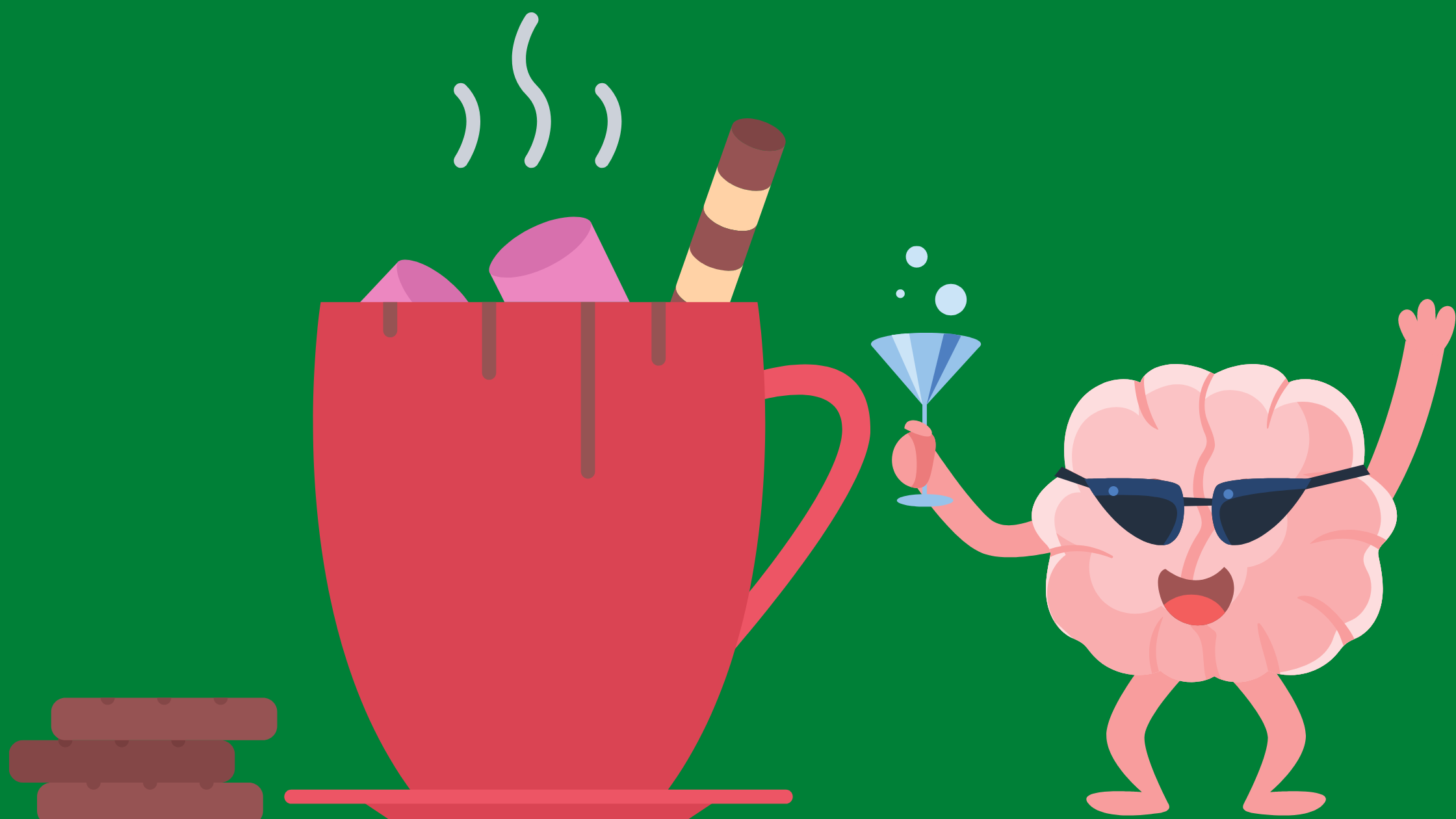The weather is getting colder, the days shorter, and the lockdowns are closing in on us by the second. But although there’s pretty much nothing that can ease the sense of desperation and the overwhelming sadness, at least it’s cold enough to finally enjoy a nice mug of hot cocoa (yes, 2020 has really lowered the bar for silver linings). And as you wrap yourself in a cozy blanket and sip your well-earned cocoa, you can feel your soul getting a little bit warmer. But did you know hot cocoa is also great for your brain, not just your soul?
Studies show that cocoa beans contain some chemical compounds which can lead to increased cognition and protection against Alzheimer’s disease. The beneficial effects of these beans come from their increased content of flavonoids (a type of antioxidants). There are several mechanisms through which flavonoids act in the brain, namely increasing the cerebral blood flow, promoting angiogenesis and neurogenesis, as well as decreasing neuronal apoptosis. So how are these mechanisms actually related to better thinking and lower risk of Alzheimer’s? Let’s take them one by one.
First of all, a good cerebral brain flow is essential for optimal brain functioning, as the blood flowing through your brain helps carry the necessary nutrients for your neurons (i.e., oxygen and glucose), as well as remove the neuronal waste. One important factor for maintaining a proper blood flow is the capacity of your blood vessels to dilate (i.e., vasodilation), and it is exactly here where flavonoids can help, because these compounds can increase vasodilation and, in consequence, stimulate blood flow into the brain. This was confirmed in several studies in which participants who were given flavonoid-rich cocoa drinks showed increased blood flow in various areas of the brain. What’s more, the vasodilation capacity decreases with age (as your blood vessels start losing their elasticity), and flavonoids actually showed a higher blood flow increase in older participants. This suggests that these molecules could be more beneficial for older people, as they can “undo” a lot of the damage caused by aging.
The second thing we mentioned, angiogenesis, is pretty straight-forward and is also related to increasing the blood supply of the brain. Angiogenesis means “birth of new blood vessels” and, as we’ve already mentioned, flavonoids promote angiogenesis, which means that they stimulate the formation of new blood vessels in the brain. This observation was also confirmed experimentally and was correlated with improved spatial memory in mice (although it remains to be confirmed experimentally in humans, which might be a tad more difficult compared to our rodent friends).
In the same experiment, researchers noted that administration of flavonoids paired with exercise led to an increase in the number dendritic spines in some parts of the hippocampus. Dendritic spines are specialized parts of the dendrite which form part of the synapse. To put it simply, the more dendritic spines your neurons have, the more synapses they can form, and, in the case of neurons from memory-associated regions, the more synapses a neuron forms, the better the memory is. Furthermore, in another experiment, scientists observed increased neurogenesis (“birth of new neurons”) in the mouse hippocampus after flavonoid administration (yes, you might’ve heard that the adult brain cannot produce new neurons, but in fact, there are some brain regions which retain this capacity into adulthood). Taken together, these findings suggest that flavonoids lead to increased cognition because they lead to improved memory due to their neurogenesis-stimulating properties.
Finally, they help against Alzheimer’s disease not only through the mechanisms mentioned before (i.e., because they improve cerebral blood flow and determine your brain to produce more neurons), but because they are capable of reducing neuronal apoptosis. Apoptosis means programmed cellular death and it is a process that happens naturally in living organisms. Usually, when a cell becomes damaged in some way, a cascade of chemical reactions is triggered and the cell dies, in order to protect the body from further harm. One good example in this sense are cells which have suffered DNA damage: if they wouldn’t undergo apoptosis as soon as some DNA damage was detected, they could risk transforming into cancer cells. Furthermore, apoptosis is done in a controlled manner, such that it also prevents your cell from spilling its contents in its environment (and damaging to the surrounding cells). In Alzheimer’s disease, however, this mechanism goes haywire and neurons undergo apoptosis at an accelerated pace. Therefore, by lowering apoptosis, flavonoids can slow down Alzheimer’s progression, and, through all the mechanisms before, they might delay, if not prevent, the onset of Alzheimer’s disease in the first place. Nevertheless, larger population studies are necessary before a definite claim is made in this regard.
So if you needed another reason for grabbing that extra cup of hot cocoa (other than the steaming pile of 2020), there you have it.
What did you think about this post? Let us know in the comments below.
And as always, don’t forget to follow us on Instagram, Twitter or Facebook to stay up-to-date with our most recent posts.
Sources
The neuroprotective effects of cocoa flavanol and its influence on cognitive performance
Dietary flavanols improve cerebral cortical oxygenation and cognition in healthy adults
Holidays and Mental Health
Română Winter holidays are supposed to be times full of sugar, spice, and everything nice, but even the most Christmas-cheerful among us have to admit that the reality doesn’t always meet these expectations. On the contrary, the expectation of “a great time” or even “the perfect holiday” tends to bring about a lot of stress…
The Smell of Memories
Română In our most recent post we talked about why our brains make the past appear rosier and we even got a brief introduction into autobiographical memories. Today we’re continuing our trip down memory lane by talking about another important memory component: smell. How many times did it happen to you to smell some freshly…
On the English Bias in Science Communication
Română In the scientific world, English has become the dominant language. Most scientific articles are published in English, most advanced science books are written in English, and most scientific conferences are held in English. In theory, this sounds great. By having all scientists capable of speaking the same language, one basically eliminates this barrier, thus…
Why Do We Sleep?
“Why do we sleep?”, your kid might ask in an annoying, but curious voice over and over again as you actually start falling asleep. But do you actually know the answer to that? “Just resting our eyes and shutting down our brains, sweetie!” Wrong again, Karen. If you think it shuts down, like a computer…
Memories, Sweet Memories
Română After an excruciatingly long week, the gifts are sitting nicely wrapped under the tree, the figgy pudding is gently resting on the table, your relatives finally figured out how to unmute themselves on Zoom and are now gesturing and blasting loudly from the small computer screen that can barely contain them anymore and you’re…
Neurofeedback – Reality or Myth?
Română One of the most popular methods in neuroscience and cognitive psychology is to correlate various behaviours, either normal or abnormal, with different patterns of brain activity. An implicit hope when it comes to abnormal behaviour is that, if we are capable of isolating the brain region which shows a dysfunction in relation to the…











Leave a Reply